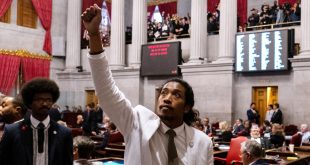[ad_1]
Silicon Valley Bank, one of the tech sector’s favorite lenders, is shutting down.
The California Department of Financial Protection and Innovation announced Friday that it was taking over and closing the distressed bank to protect deposits, naming the Federal Deposit Insurance Corporation as its receiver. The FDIC in turn formed a separate entity where all insured SVB deposits would be transferred.
The move came after a tumultuous morning during which trading of the bank’s shares was halted Friday after the stock fell by double-digits in pre-market trading, on the heels of a more than 60% decline Thursday.
Other bank stocks slipped in Thursday trading as well, underscoring investor worries about broader risks to the financial industry.
Concerns over a run at the Santa Clara, California-based bank, the 16th largest bank in the country, have led stock market investors to dump shares of other bank stocks as well. Jitters around SVB followed the news this week that Silvergate, a much smaller bank largely focused on the cryptocurrency industry, announced plans to shut down.
Silicon Valley Bank didn’t respond to a request for comment.
The drama started earlier this week, when SVB disclosed that it sold about $21 billion of securities and proposed to offer over $1 billion in shares, all to fundraise for “general corporate purposes.”
That move raised eyebrows among investors who pondered why the bank would need to raise so much money abruptly. It also sparked concerns among depositors, many of whom suddenly wondered whether their money was safe at Silicon Valley Bank — a lender known for helping to finance the explosion of tech companies in the San Francisco Bay Area.
On Thursday, The Information reported that Silicon Valley Bank CEO Greg Becker was asking venture capital clients to “stay calm” as some tech founders began clarifying if their companies did have money at Silicon Valley Bank.
The concerns around SVB are linked to its concentration in the tech sector, an industry walloped by high interest rates and an economic slowdown.
Many of the Santa Clara, California-based bank’s depositors are tech companies and venture capital funds, and it doesn’t rely on mom-and-pop savings accounts like banks familiar to the average U.S. household.
Shares in some other prominent West Coast banks were also down sharply Friday. First Republic Bank, a San Francisco-based lender whose clients include prominent Silicon Valley executives including Mark Zuckerberg, was down 17%. Shares in PacWest Bancorp, a Los Angeles-based bank, and Phoenix-based Western Alliance Bancorporation were both down as much as 23%.
First Republic submitting a filing to the Securities and Exchange Commission Friday morning that “reiterates [its] continued safety and stability and strong capital and liquidity positions.”
Speaking to House lawmakers on Friday, Treasury Secretary Janet Yellen said, “There are recent developments that concern a few banks that I’m monitoring very carefully, and when banks experience financial loss it is and should be a matter of concern.”
Economists weighed in on the crisis Friday, with Cambridge University economist Mohamed El-Erian tweeting that “the most vulnerable currently are those vulnerable to both interest rate and credit risk,” adding that “the systemic threat can be easily contained by careful balance sheet management and avoiding more policy mistakes.”
SVB’s tech-focused strategy has helped it ride the industry’s massive growth leading up to and through the pandemic. But overzealous hiring during the public health crisis has more recently led the tech sector to institute sweeping layoffs, as the Federal Reserve sharply increased borrowing costs to cool inflation and has raised expectations of an economic slowdown.
“The issue here is what is the domino effect of problems outside the banking industry on the banks themselves?” said Mike Mayo, a bank analyst at Wells Fargo Securities. “Banks are still the heart of the economy, and if there’s issues, then banks are going to feel it.”
Mayo cautioned that the banking system overall has more robust guardrails now than it did 15 years ago, due to policies put in place after the last financial crisis such as regulations imposing stronger capital and liquidity requirements.
Silicon Valley Bank is subject to even more stringent regulations as one of the country’s top 20 banks by total assets. Like other Federal Deposit Insurance Corporation-member banks, deposits at the bank are also insured up to $250,000 per depositor.
[ad_2]
 Latest Breaking News Online News Portal
Latest Breaking News Online News Portal





